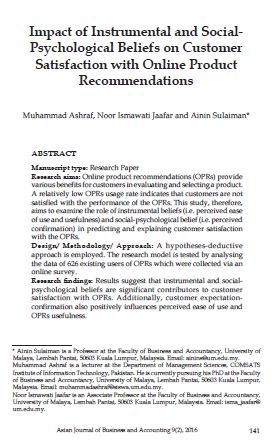Impact of Instrumental and Social- Psychological Beliefs on Customer Satisfaction with Online Product Recommendations
Abstract
Manuscript type: Research Paper
Research aims: Online product recommendations (OPRs) provide
various benefits for customers in evaluating and selecting a product.
A relatively low OPRs usage rate indicates that customers are not
satisfied with the performance of the OPRs. This study, therefore,
aims to examine the role of instrumental beliefs (i.e. perceived ease
of use and usefulness) and social-psychological belief (i.e. perceived
confirmation) in predicting and explaining customer satisfaction
with the OPRs.
Design/ Methodology/ Approach: A hypotheses-deductive
approach is employed. The research model is tested by analysing
the data of 626 existing users of OPRs which were collected via an
online survey.
Research findings: Results suggest that instrumental and socialpsychological
beliefs are significant contributors to customer
satisfaction with OPRs. Additionally, customer expectationconfirmation
also positively influences perceived ease of use and
OPRs usefulness.
Theoretical contribution/ Originality: No prior study has
examined the role of instrumental beliefs (i.e. perceived ease of
use and usefulness) and social-psychological belief (i.e. perceived
confirmation) in predicting customer satisfaction with the OPRs.
This study has successfully tested the relationships which are likely
to ensure a stable theory development.
Practitioner/ Policy implications: Since majority of the respondents
were from western countries, the findings would be useful to
e-retailers in Asia who are targeting or intending to penetrate the
global market, in particular, Amazon customers. Practitioners
should adopt a twofold strategy: (a) to inform new customers
about the potential benefits of OPRs in terms of its ease of use
and usefulness; and (b) to educate old customers on how to use
OPRs effectively so as to maximise expectation-confirmation and
satisfaction.
Research limitations/ Implications: This study employs a crosssectional
design rather than a longitudinal design. However,
given that the objective of this study is to examine the impact
of instrumental and social-psychological beliefs on customer
satisfaction, a cross-sectional design is deemed more suitable.
The outcome of this study suggests that cultural differences
need to be considered when e-retailers are thinking of making
such implications on Asian online customers as majority of the
respondents in the current study were from non-Asian countries.
Keywords: Ease of Use, Expectation-Confirmation, Online Product
Recommendations, Satisfaction, Usefulness
JEL Classification: M3
Downloads








